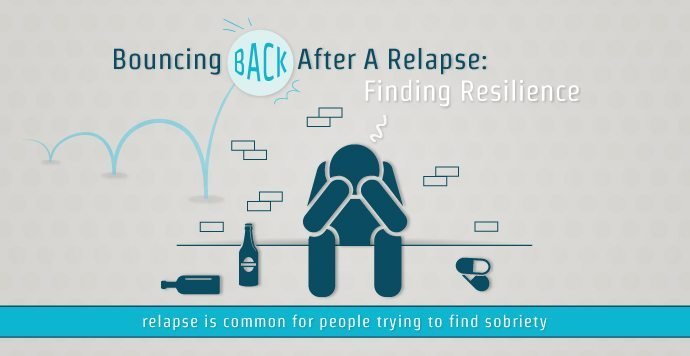Bouncing Back After A Relapse: Finding Resilience

What Are You Doing?!
I distinctly remember hearing a voice in my head asking me this question when I set—once again—down the path of a relapse.
I had tried for about six years to stay sober. I was unsuccessful at maintaining any length of sobriety. Some time in 2005, the situation first became obvious: I was a raging alcoholic (albeit a closet one) and a pill fiend.
I suppose one first, good indication that I had a problem was when I had stupidly called my wife up at work in a blackout to talk to her. In ’05, I was employed as a Lutheran pastor in a small, rural community in western North Dakota. By that time, if I couldn’t score pills through doctor shopping, I went back to the old reliable: booze. I tried whatever possible to remove me from myself, because I didn’t like who I was and I was frequently depressed.
When I called her (so she reports, I don’t remember doing it) I was slurring my words. Being the concerned spouse she is, she decided to punch out and drive home to see what the hell I was doing.
She entered our home only to see me—stark naked—only wearing my son’s Mickey Mouse hat, passed out on the couch. Beside me lay a quarter-full bottle of Old Crow whiskey.
As I said, I was completely blacked out, so I don’t recall the conversation that took place between her and me, but I’m pretty sure it included plenty of screaming and threats to leave the marriage.
This story is one of a whole slew of train wrecks that are so common for every alcoholic or addict.
The question that admittedly still befuddles me: Why in the world would I have wanted to go back to that existence after sobering up?
But . . . Go Back I Did.
Relapse is common for people trying to find sobriety. Like other chronic medical conditions such as diabetes, heart disease, asthma, or hypertension—all of which also have a behavioral component to them—relapse often isn’t a question of if, but of when it’s going to happen. Relapse rates vary, but in general the statistics on addiction relapse are on par with other chronic diseases.
However, all is not lost. People do recover and they can learn to manage the symptoms of chronic addiction.
In my case, I needed plenty of “research” before I was ready to take the medical advice I had received in several inpatient treatments through the years. Addiction simply is a difficult illness to master, because it directly affects the brain. Since the behaviors associated with addiction (drinking, drug use) originate from the brain itself, an addict or alcoholic finds him- or herself within a seemingly inescapable conundrum:
You cannot, not use. But you cannot continue to use, either!
“Normal” people don’t seem to understand how enormously frustrating and complex this conundrum is for us.
Left to our own resources, addicts and alcoholics lapse back into drug or alcohol use, because it is an easier, short-term solution than having to deal with the pain of withdrawal or life without our substance of choice.
So what’s the solution?
The obvious one spells another stay in a treatment facility. Still, there are other aspects to consider. One is learning resilience.
Psychological resilience is the ability to “bounce back” after a traumatic or adverse event. Since addiction to drugs or alcohol certainly qualifies as an adverse event, learning to develop and foster resilience is a key strategy to recovery. In early recovery, developing resilience is particularly important, especially in the face of constant, potential relapses.
The good news about resilience is that the trait isn’t an extraordinary gift that only some people possess. Stephen Southwick, a professor of psychiatry at Yale Medical School found what many other researchers have since confirmed in other studies: “When we began our study, we assumed that resilience was rare and resilient people were somehow special, perhaps genetically gifted. It turns out, we were wrong.”
Resilience can be learned and developed. The steps to recovery, as a process, are straightforward enough. The difficulty lies in their implementation. Still, the following concepts are worth repeating:
Set Goals And Stick To Them
Directly after the events I shared with you in the little vignette in the beginning, I remember feeling awful. Physically, alcohol is incredibly hard on your system. Emotionally, I remember feeling like my butt bounced on the bottom of the Pacific Ocean. This experience, I’ve since learned, is common with all alcoholics—it’s a vicious cycle. What happens after is just as common.
Not long after I sobered up (at that time it only took a couple of days), I felt great again. I thought: “That really sucked. But I just hit it too hard. Next time will be different.” The next time is different. Maybe it’s even fun. But another hard bottom is coming; it’s inevitable, in fact.
Acting resilient won’t feel good. It’s work. It requires that you make achievable goals and stick to them. Left alone, most alcoholics and addicts won’t follow the rules they set for themselves though.
Again, all is not lost.
Reach Out To Others Who Understand
The reason why Twelve Step and other support groups are so popular is because “in the rooms” an addict or alcoholic will find empathy. Your experience is much less unique than you imagine.
These groups aren’t places for a pity-party. Instead, they serve as a forum to voice your struggles and a safe place to listen to others’. Every group will have its own language, rituals, and rules for acceptable behavior or operation. If you feel uncomfortable at one, find another group—there are many modalities for recovery. In addition to behavioral therapies, a plethora of medical treatments (some new) exist and continue to be developed.
Take Action And Continue To Follow Through
This last point is perhaps the most difficult for alcoholics and addicts to accept, because taking action feels so much like defeat. No one likes to think of himself or herself as a loser. We want to be masters of our own domain. The risk of this type of thinking, however, is that we are deluding ourselves—we are obviously not in control. Seeking help through professional treatment is not only a good decision, that option often is also the only one presented to us besides continuing to suffer.
It’s important to keep a healthy perspective though: you are not the first to experience how rough addiction can be, and you certainly aren’t the last. Your admission of “defeat,” in fact, is a great triumph. It shows that you are larger than your animal instincts; you’re a human being who has the capacity to act on choices that will be healthy for you in the long term.
And the gift of insight, and taking proactive steps to change your life, defines what resilience really is.
Daniel D. Maurer is a freelance writer openly living in long-term recovery. He is the author of Sobriety: A Graphic Novel, a Hazelden Publishing youth and young adult resource. He lives with his family in Saint Paul, Minnesota.




